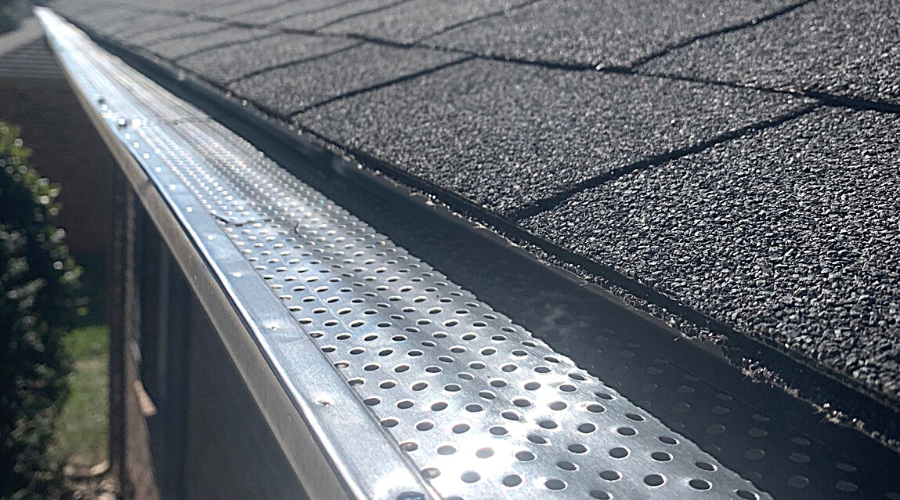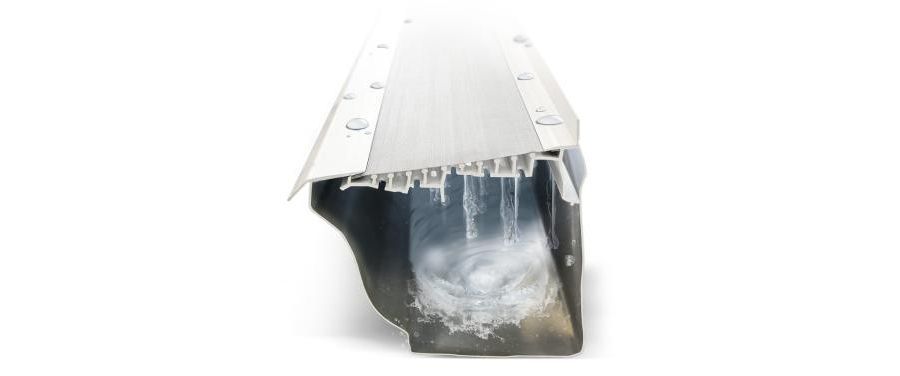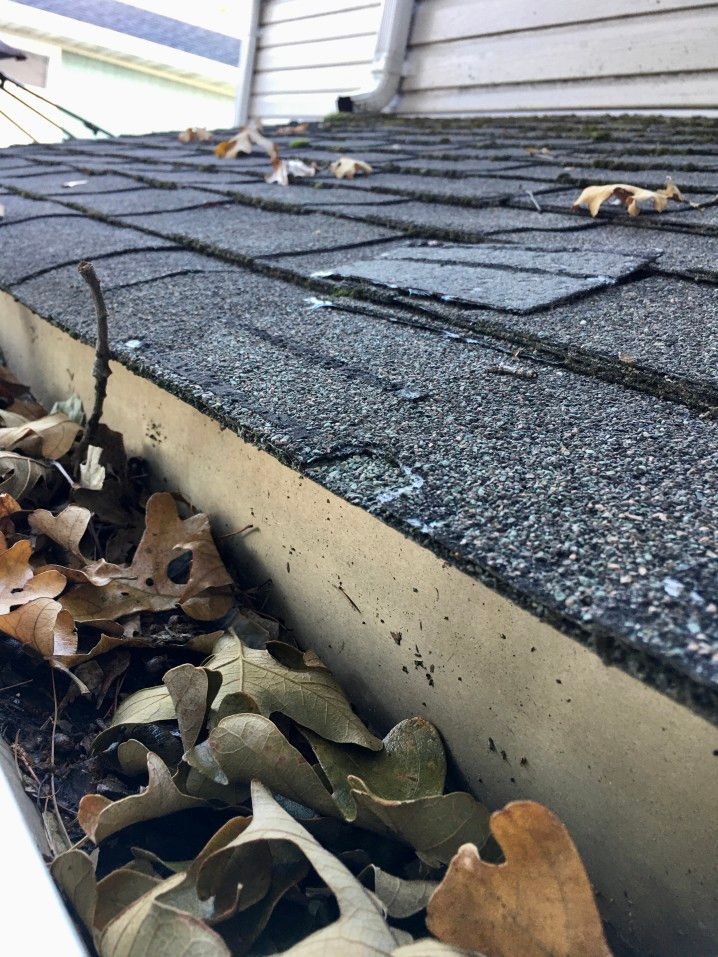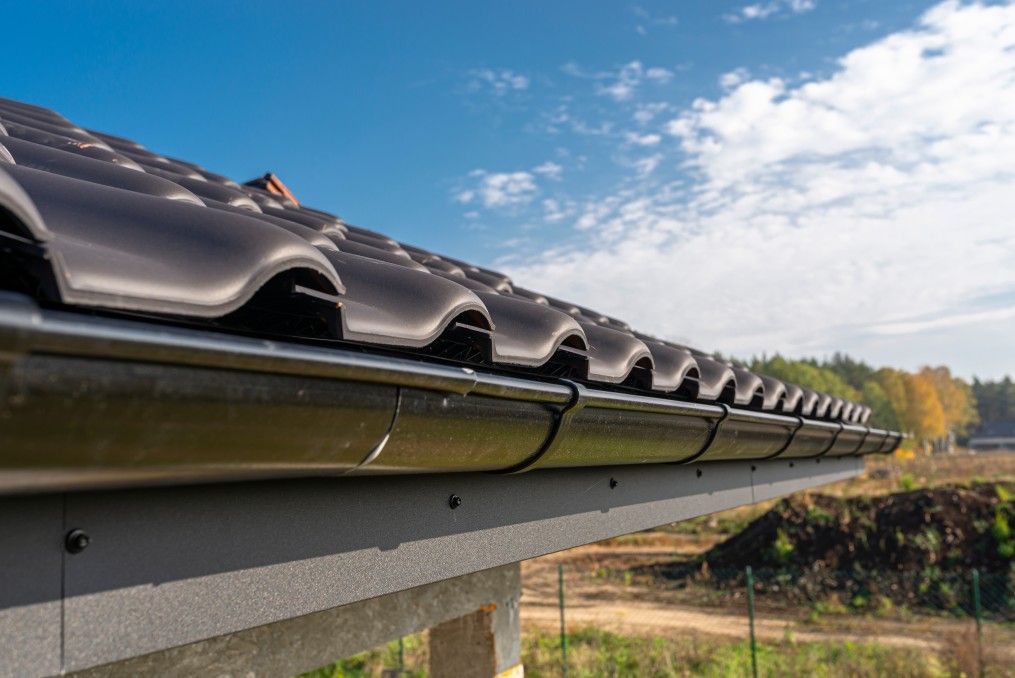Hate the dirty, grueling, time-consuming job of cleaning out your gutters? Wish there were a simple way to keep them clean? Wish no longer, instead consider installing some gutter guards. This complete guide will answer every question you could have about them, including the essential one: do gutter guards work?
Our Top Choice - LeafFilter
Our top choice in gutter guards. Their professional installers clean and align your gutters prior to being installed, which is super important for gutter guards to last. It's one of the most durable products on the market comprised of stainless steel, unlike other gutter guard models on the market. It is also backed by a transferable lifetime warranty. To top it off we have a 10% discount link below.
Do Gutter Guards Do What They Should?
A gutter without guards will collect debris year-round, but especially in the fall.
You’ve tried everything, the best gutter brushes on the market, hiring someone to clean out your gutters for you, and now you’ve reached the final solution: installing gutter guards. But do they work?
The answer is yes. Or rather, mostly yes. Gutter guards are surprisingly effective at keeping gutters free from debris. Of course, not all gutter guards are created equal; make sure that you are using a high-quality gutter guard and that it’s been properly installed to reap the most benefits from it.
Depending on which type of guard you install, its pros and cons will be different. It will filter different-sized debris, with most letting in smaller debris particles and some letting in litter like sticks and acorns.
How Do They Do It?
When gutters are open, they often collect debris like pine needles, fallen leaves, sticks, acorns, and pollen, which results in them needing to be frequently cleaned. Gutter guards prevent clogging by covering the gutter with a material that allows water to fall through but keeps debris. How exactly a gutter guard works depends on the type of gutter guard.
What About Pine Needles?
Most gutter guards won’t keep out all debris. They need openings and holes for water to pass through, which allow smaller items, like pine needles, to get through. However, not all gutter guards are created equal and the best gutter guards feature steel mesh guards that are engineered to keep out tiny debris like pine needles.
By keeping out larger debris, like leaves and sticks, gutter guards reduce how frequently you have to clean your gutters, but they are not infallible, so some smaller things will get through and will eventually need to be cleaned out.
What About Leaves?
The debris item that gutter guards are most oriented towards keeping out of your gutters is leaves. Leaves, particularly in the fall time, tend to clog gutters, causing the most drainage problems. It should be noted, though, that some gutter guard types are better at keeping leaves out than others.
What Types of Gutter Guards are Best for This?
Not all gutter guards were created equal; some are generally better than others, while some are better for blocking certain debris types. You can evaluate the strengths and weaknesses of the six most popular types of gutter guards described below.
Bottlebrush Guards
Bottlebrush gutter guards look like giant pipe cleaners. They have tons of bristles that are almost brush-like and which collect debris as it falls. When the bristles are turned, they face upright, water will flow through them, into the gutter, and then through the downspout while they gather debris.
Vinyl Guards
A vinyl gutter guard is a convenient, effective solution for keeping your gutters debris free. They can be attached directly to your gutters, unlike other guards, which often require you to attach them to your roofing shingles. Vinyl guards have several recessed slots that catch debris as water runs through them. However, the more trash they grab, the more they limit the water that can run through them, so you occasionally have to clean them out.
Reverse Curve Guards
Reverse curve guards have one of the most innovative designs for reducing the amount of debris clogging your gutter. These guards are designed to direct the flow of water down the gutter system through small slots in its vertical face while it encourages waste to fall or blow over the gutter, down onto the ground.
Mesh (Micromesh) Guards
One of the most popular gutter guards, probably because of their simplicity, is mesh gutter guards. These super-simple gutter guards typically are sheets of mesh that attach to your roof’s shingles to cover your gutter. The small holes in the mesh sift out debris while water flows smoothly through them. While they are useful, they don’t last very long and typically need to be replaced every couple of seasons.
Louver Guards
If you hate the look and even the idea of gutters, then a louver guard is perfect for you. This innovative system diverts rain off rooftops without using gutters, thus allowing you to remove any need for gutters or guards. However Louver Gutter Guards have long wide openings allowing more debris to get in and you'll probably need to clean your gutters out a few timers per year.
Foam Guards
Although foam gutter guards may look like they belong in your pool as a noodle, they are surprisingly effective at filtering out your gutter’s debris. These long foam tubes are constructed from a plastic material that fits snugly inside your gutter. They are inexpensive and easy to install. However, they hinder water flow and tend to grow plants over time, making it more of a temporary solution.
Pros and Cons of Gutter Guards
Although gutter guards are indubitably great for lessening how frequently you have to clean your gutters out, they have their downsides. Below I have highlighted the pros and cons of gutter guards.
What are the Downsides of Gutter Guards?
One of the most significant downsides of gutter guards is that they can be expensive to install. If you want them installed by a company that customizes them, you’ll have to pay big bucks. A way to get around that is buying gutter guards online and installing them yourself or hiring a handyman to do it. However, the latter option may result in less effective gutter guards if they are not installed correctly.
Another thing to consider before evaluating the cost of gutter guards is how frequently you have to clean out your gutters. If it’s only once a year, it would be much more cost-effective to hire someone to do it, while if it’s 2 - 3 times a year, gutter guards could be the better financial choice.
The other big downside of some gutter guards is that they cause water to go straight over your gutters instead of directly into the gutter system. If you already suffer from the problem of water shooting over your gutters, gutter covers will exacerbate it, so they probably aren’t a good option for you.
Why Should I Install Gutter Guards?
If you hate the arduous chore of cleaning out your gutters a few times a year, then you should install gutter guards. Their upside is that they keep your gutters relatively debris-free, giving you more free time to do things you enjoy, like activities other than scooping out clumps of moist, moldy leaves from your gutters.
Gutter guards can also prevent issues resulting from debris clogging your gutters, like roof leaks, mold damage, flooding inside your home, foundation damage, and pest damage. They will also require you to do a lot less gutter and roof maintenance.
Yes, Gutter Guards Work!
In short, gutter guards do work and are an effective method for keeping debris from clogging your gutters. However, some types of gutter guards are better than others, and they aren’t an excellent option for everyone; it depends on your situation.
I hope you found this guide to gutter guards helpful! If you did, be sure to share it and comment below with any questions!




